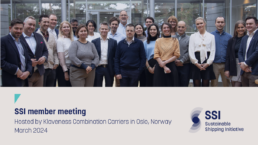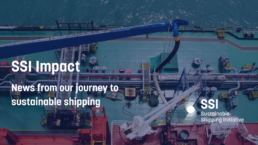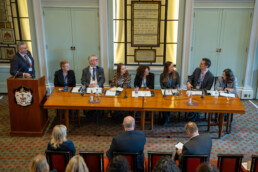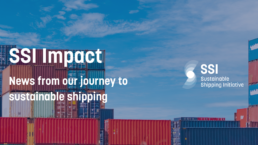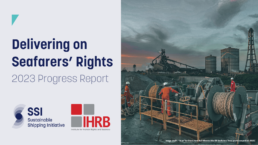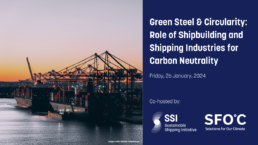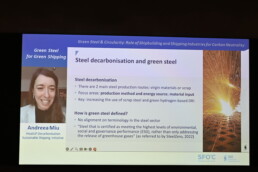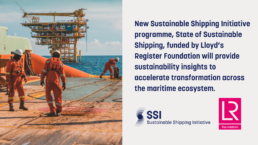15 December 2022 – 2022 has brought with it renewed connectivity and a return to normality for most of us, with conferences and in-person meetings returning to the agenda. However, it was also a stark reminder that we cannot continue behaving in our current and historic unsustainable ways. Change is crucial if we are to adapt to the needs of a sustainable future. SSI’s mission to be a catalyst for a sustainable and successful shipping industry remains as pertinent as ever, and we continue on this crucial journey. Within the SSI, this year has granted our members and secretariat greater opportunities for in-person dialogue and collaboration, to discuss and brainstorm ideas for furthering our existing work, as well as to identify new focus areas where we can create impact. With this in mind, 2022 was a year of planning and growth for the SSI. We have had the pleasure of growing our secretariat, with two new employees, along with two new members, the Institute for Human Rights and Business (IHRB) and, our first port member, the Vancouver Fraser Port Authority.
Behind the scenes, we have been working on an updated strategy. Through an in-person workshop in March this year, members got to make their mark on the strategy, ensuring that it leads to a stronger SSI that can catalyse demonstrable progress within the industry, with the support and active engagement of our member and partner network. Part of this change includes expanding our membership offering to ensure greater opportunities for those in the maritime ecosystem to get involved. New members and partners will allow for a broader range of perspectives as we identify ways to tackle the sustainability challenges of the maritime sector together.
At the same time, we understand that shipping’s operations are intertwined within a wider system. No company or industry can singlehandedly solve the systemic challenges that propel inequality and the climate, biodiversity, and pollution crises. In 2023, we are excited to continue working with various stakeholders within and outside of the maritime sector, ensuring that we are hearing from new voices and learning from unique perspectives and experiences, so that we are in a position to support each other through this sustainability transformation.
Our current working groups engage with sustainability holistically and aim to tackle some of the systemic issues that the sector needs to address in order to forge a better path forward for both people and the planet. Looking ahead to the coming year, we will continue shining a light on emerging issues that require action.
This year saw SSI build on last year’s Exploring shipping’s transition to a circular industry report through the Ship lifecycle working group. Collaborating with members, academic institutions, and organisations across the shipping and steel sectors, we are exploring the topic of sustainable steel, lower-carbon steel shipbuilding, and the drivers and barriers to closing the loop on steel within the shipping value chain. The coming months will see the presentation of this research to the industry and an outreach campaign to encourage industry uptake and further discussions around this important topic.
As shipping embarks on its sustainability transition, we have the opportunity to build resilient, sustainable supply chains. We have continued to work on advocacy for the Sustainability criteria for marine fuels work, which aims to ensure that sustainability is considered at the same level as availability, cost, and technical feasibility in discussions about future fuels. Through SSI’s member WWF, we are engaged in an IMO correspondence group tasked with the development of fuel lifecycle guidelines. In addition to this, we have promoted the criteria at various events, and have focused on collaboration – partnering with the Mærsk Mc-Kinney Møller Center for Zero Carbon Shipping with the objective of sharing knowledge and best practice on shipping’s sustainable decarbonisation. 2023 will see us continue to build up dialogue and partnerships on this topic, as well as test the application of the criteria in the context of green corridors.
At the same time, we must continue to shine a light on those impacted by the changes to the industry. In October SSI and IHRB released the first Delivering on seafarers’ rights progress report, reflecting on progress since the launch of the Code of Conduct and self-assessment questionnaire. The SEAFAIRER Roundtable convened seafarers, shipowners and others to share their experiences, learnings, and best practices on topics such as shore leave, gender, diversity, and discrimination. In the coming year, we will continue tracking progress whilst convening inclusive environments for experts and seafarers to share their experiences and best practices on key issues. Accompanying this, we are continuing to engage with cargo owners, shipowners, managers, and charters to encourage uptake of the Code of Conduct and increase transparency on progress and results to better champion seafarers’ rights to a safe, healthy, and secure environment.
Finally, we are working to ensure that the Roadmap to a sustainable shipping industry acts as a living tool for the sector, tracking industry progress in a way that stimulates action towards sustainability. We will commence updating each vision area to ensure that the roadmap reflects global challenges and trends across the maritime ecosystem. Going forward, the Roadmap will act as a compass for the maritime sector, allowing better navigation of sustainability challenges, transitions, and emerging issues, whilst simultaneously shining a light on positive changes within the sustainability journey.
I am very proud to see the progress that SSI has made – the new relationships, valuable insights, and fresh perspectives originating from the SSI community, from the secretariat to the members, trustees, and all external partners and stakeholders that have made presentations and otherwise engaged with our work.
Shipping has a crucial role to play in establishing a resilient supply chain both within shipping and when servicing other industries. I am confident that the research SSI has shared, and will continue to share, will catalyse further transformation as shipping embarks on its just and green transition. The time to act is now – we must not let the perfect become the enemy of what is good and needed. Let us navigate the course to sustainable shipping, together.
Wishing all a good holiday season and a happy new year,

Guy Campbell
Chair
Sustainable Shipping Initiative


